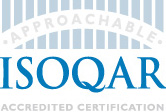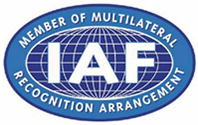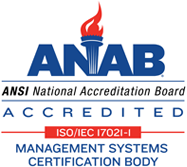ISO 45001- Health and Safety
ISOQAR currently offers UKAS accredited certificates for this standard.
Many organizations are now looking at implementing the Occupational Health and Safety Management System (ISO 45001). Although not a legal requirement, it is a recognized specification that structures the implementation of an effective H & S management system. This overview takes a brief look at the reasons why certification may be appropriate for your company. It also includes details about where to obtain further information.
What is ISO 45001?
ISO 45001 is the certification specification for Occupational Health and Safety Management Systems. It is based on already published criteria such as BS 8800 and the Management Regulations 1992. ISO 45001 is an audit/certification specification, not a legislative requirement or a guide to implementation.
Why seek registration to ISO 45001?
Registration to ISO 45001 by an independent, third party, certification body (CB) such as ISOQAR demonstrates a commitment to implement, maintain and improve the way in which you manage your Health and Safety system.
Organizations registered to ISO 45001 can be more confident about meeting the requirements of H & S legislation. The setting of targets through the Health and Safety policy, together with the ongoing measurement against it ensures a process of continual improvement.
How do you start to implement ISO 45001? What is involved?
Firstly, evaluate the Health and Safety needs of your staff and visitors. Then identify the boundaries of your Health and Safety system and document your procedures for meeting the requirements of ISO 45001. Ensure these procedures are fully implemented, then audit and review them.
Once developed, internal audits are needed to ensure the system continues to be effective. Always bear in mind the need to conform to legislative requirements.
Audit to ISO 45001
Having chosen a third party CB, such as ISOQAR for your audit, it will review your documentation to ascertain that it meets all the requirements of ISO 45001. This is followed at a later date by an audit to check that records are being kept and documented working practices are being followed.
After a successful audit, a certificate of registration to ISO 45001 will be issued. There will then be continual surveillance visits (usually once a year) to ensure that the system is maintained and continues to be effective.
Why choose ISOQAR for your audit?
ISOQAR has an enviable record for customer satisfaction with its registration services. A friendly approach to audits and dislike of bureaucracy has led to unprecedented growth through referrals from contented clients. ISOQAR only employs auditors who have empathy with this approach. Auditors are also carefully allocated by their experience in the industry they are auditing. This results in a practical, meaningful audit, carried out in an air of mutual understanding. ISOQAR firmly believes that any audit should benefit the organization that requests it, not be an intellectual exercise to ‘please’ the auditor.
What is the cost of audit to ISO 45001?
There are many variables to consider in assessing the cost of an audit, such as an organization’s type and size, and the possible resultant effect it has on the environment. Consequently, we ask you to complete a short questionnaire to help us learn about your organization. From this, we can provide you with a fixed, written quotation of the fees involved. Organizations that are ISO 45001 registered with ISOQAR may benefit from reduced annual registration fees for ISO 45001 certification. This is because there are some common elements to the auditing process.
Joint ISO 45001, ISO 9000 and ISO 14001 systems
There are several common elements between these three systems, such as management review, document control, corrective action and the requirement for trained personnel. These can be integrated into a single, joint system or a combination of any of the above. Audit of joint systems is available and may be the best method for some companies.
Integrated systems not only help organizations internally, by reducing duplication and providing a centralized document control system, but may also offer a cost benefit for your third-party audit.
Where to obtain further information or help
The ISO 45001 specification is available from The American National Standards Institute (www.ansi.org or 1-212-642-4900 for more information). The American Society for Quality can also help. Telephone them on 1-800-248-1946 for a Product Guide and order form. Both should be able to provide a range of publications about Health and Safety.


